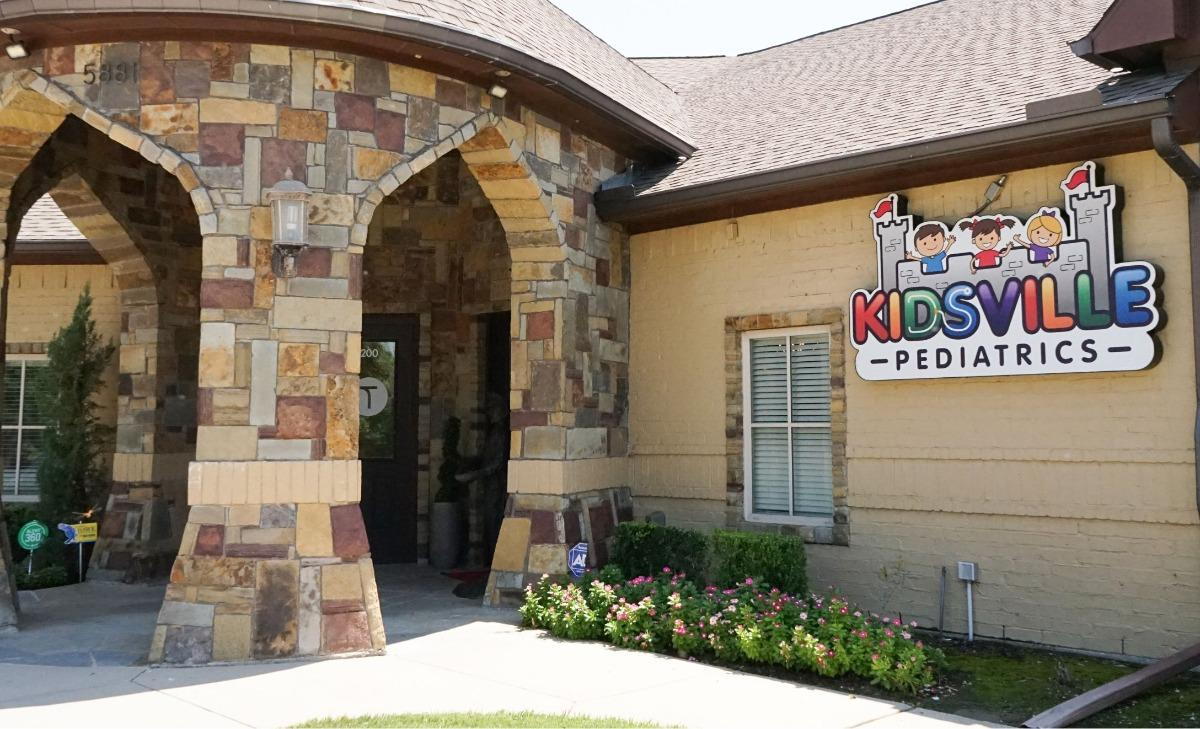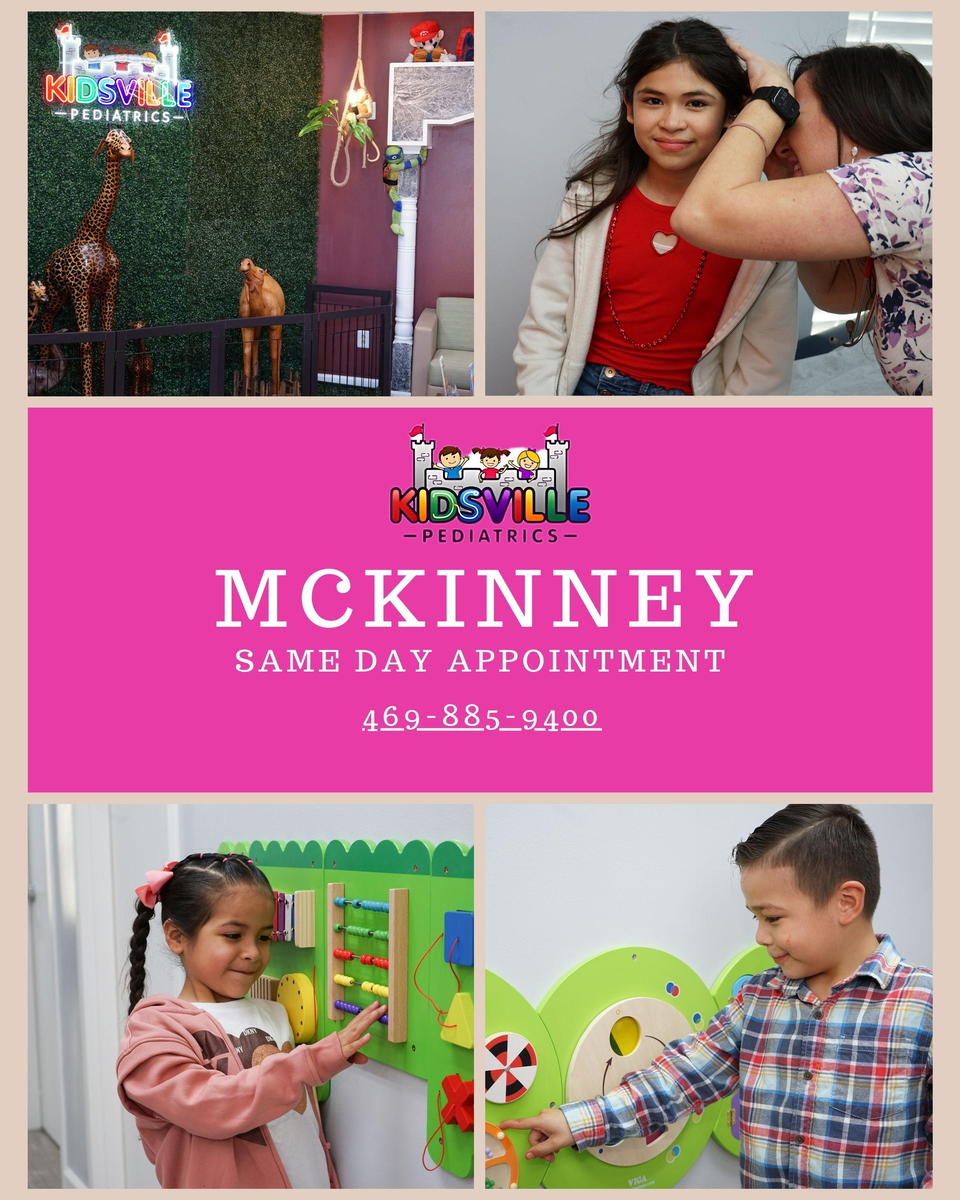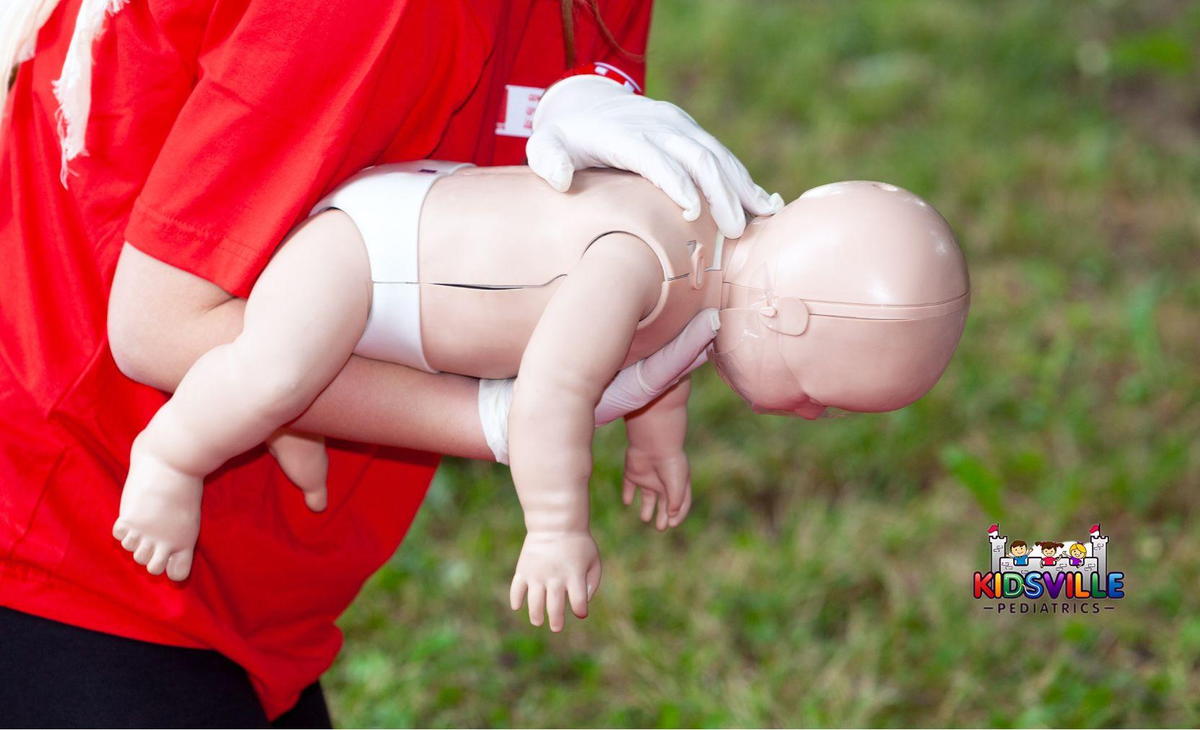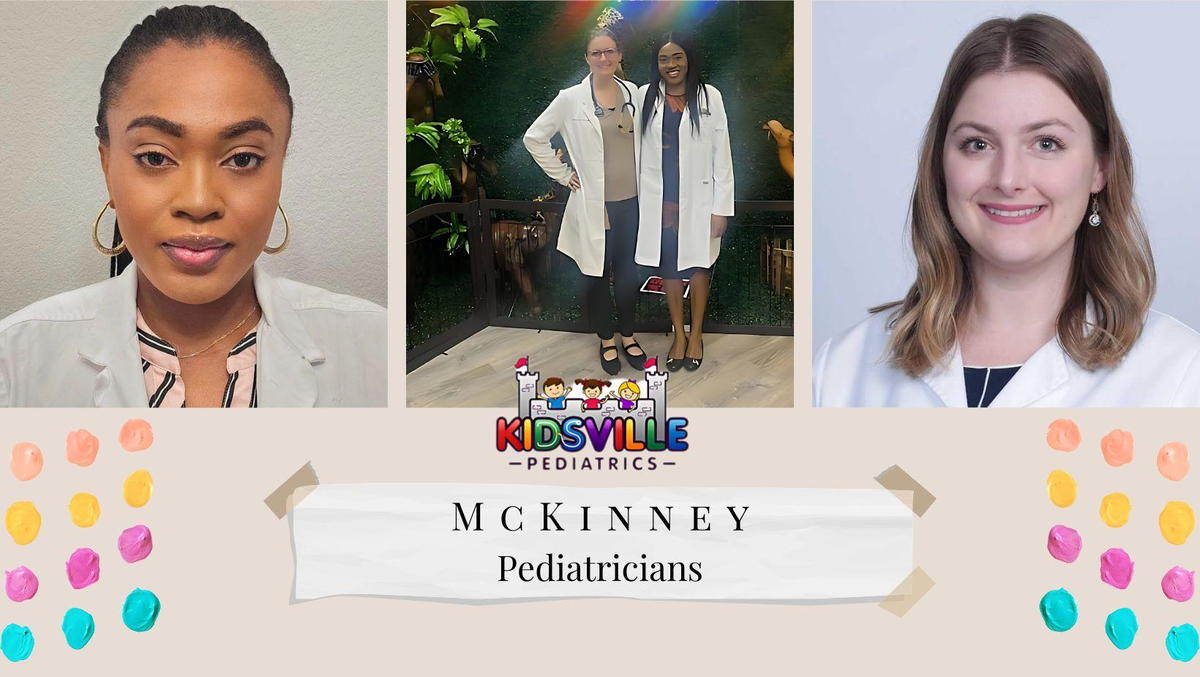
Imagine this: Your child wakes up feeling unwell, and you know they need to see a doctor right away. But instead of worrying about long waits or trying to squeeze an appointment into your already busy day, you can relax knowing that help is just a call away. At Kidsville Pediatrics McKinney, we understand that when it comes to your child's health, timing is everything. That's why we're excited to offer our same day appointment, making it easier than ever to get the care your child needs exactly when they need it.
No more waiting for days or stressing over a full schedule. With our same-day appointment service, you have the flexibility to address your child's health concerns without the long delays. Whether it's a sudden illness, a minor injury, or just a check-up that's been on your mind, we're here to ensure that your child gets the prompt attention they deserve. Our dedicated team of pediatric healthcare McKinney experts is ready to provide top-notch care in a warm and welcoming environment, so you can focus on what matters most—your child's well-being.
Same day scheduling means peace of mind for you and timely care for your little one. Stay tuned as we dive into how this service works, the benefits it offers, and why it's a game-changer for busy parents like you. Get ready to discover how easy it is to prioritize your child's health with our convenient same-day appointments!
The Benefits of Same-Day Appointments for Busy Parents

When your child is under the weather, quick access to medical care is crucial. We understand the urgency that comes with a sick child. That's why we proudly offer same day scheduling for pediatric appointments, ensuring that your little one receives the care they need without delay.
Why Same-Day Scheduling Matters
When your child is unwell, visiting a pediatrician who can see them the same day is essential. Immediate medical attention helps address symptoms early, preventing minor issues from escalating into more serious conditions. Our McKinney pediatrics doctors are dedicated to providing prompt, expert care tailored to your child’s needs. By choosing same-day scheduling, you benefit from the familiarity and expertise of your child's primary pediatrician, who knows their medical history and can offer personalized care.
Certain symptoms can indicate conditions that require timely medical evaluation and intervention. By opting for same day scheduling, you can ensure that your child receives prompt care, reducing the risk of complications and promoting a quicker recovery.
For your child, receiving timely treatment can lead to faster recovery and greater comfort. When you schedule a same-day visit, you also gain peace of mind, knowing that your child’s health is being addressed promptly. This service minimizes the stress of long waits and avoids unnecessary trips to urgent care or emergency rooms, which can be both time-consuming and costly.
Additionally, a same day appointment allows you to maintain continuity of care with your child's trusted pediatrician, who is already familiar with their health history. This personalized approach ensures that your child receives the most effective treatment tailored to their specific needs.
When to Opt for a Same Day Appointment
Certain symptoms warrant an urgent visit to McKinney pediatricians. If your child exhibits any of the following signs, don't hesitate to schedule a same-day appointment with us:
High Fever

Normal body temperature differs from person to person and can fluctuate during the day. For preschool-aged children, body temperature tends to be higher, peaking between 18 to 24 months. Despite these natural variations, most pediatricians define a fever as a rectal temperature of 100.4°F (38°C) or higher. It’s important to use a rectal thermometer for the most accurate measurement, as other methods may provide less reliable results.
Parents often worry about the height of their child's fever, but it’s important to remember that the severity of the fever doesn’t always correlate with the seriousness of the illness. A high fever can sometimes accompany minor illnesses, while some serious conditions might only cause a mild fever. Other symptoms, such as difficulty breathing, confusion, or a lack of hydration, are better indicators of how serious the illness might be.
Extreme temperatures, such as those exceeding 106°F (41°C), can be dangerous, though such high fevers are rare. If your child experiences a very high fever, it is crucial to seek medical attention promptly.
Interestingly, fever can play a beneficial role in fighting infections. It’s thought that reducing a fever might sometimes prolong certain illnesses or interfere with the immune system’s response. Therefore, while fever can be uncomfortable, it doesn’t always require immediate treatment in otherwise healthy children. However, if your child has underlying health conditions such as lung, heart, or brain disorders, managing fever becomes more critical. In these cases, a fever can place additional stress on the body, such as increasing the heart rate.
Infants with a fever may be particularly irritable and might have trouble sleeping or feeding. Older children might lose interest in play and become more subdued. Generally, as fever increases, so does irritability and disinterest. However, there are instances where children with high fevers may appear surprisingly well. It’s also important to be aware of febrile seizures, which can occur when a child’s temperature rises or falls rapidly.
In rare cases, a fever can become so high that it leads to listlessness, drowsiness, or unresponsiveness. If you notice these symptoms, it's crucial to contact a pediatrician in McKinney immediately.
If you're concerned about your child’s fever, whether due to its height or accompanying symptoms, don't hesitate to reach out to your pediatrician McKinney team. We’re here, at Kidsville Pediatrics, to provide guidance and ensure your child receives the care they need. Remember, timely and appropriate medical intervention can make a significant difference in your child’s recovery and overall health.
Severe Cough

A chronic cough in children can stem from various sources, which can be broadly categorized into two main types:
1. Infection-Related Causes:
Chronic coughs can result from infections that may be contagious. These include:
Viral Infections: Common colds and flu can lead to prolonged coughing.
Bacterial Infections: Conditions like pneumonia or bronchitis.
Tuberculosis: A less common but serious infection affecting the lungs.
2. Non-Infection-Related Causes:
Several factors unrelated to infections can also cause a chronic cough:
Pediatric Allergic Rhinitis: Allergies causing nasal congestion and post-nasal drip.
Asthma: Involves airway inflammation and constriction.
Acid Reflux: Stomach acids irritating the throat.
Foreign Objects: Objects lodged in the airways.
Environmental Triggers: Exposure to cigarette smoke, fumes, or chemicals.
When your child develops severe cough, it’s crucial to monitor its duration and characteristics. Typically, a cough following a respiratory infection should resolve within a month. However, if it persists beyond this period, seeking help from a pediatrician is essential.
Initial Steps:
Consult Your Pediatrician: Schedule a same day appointment if the cough lasts more than a week. Your pediatrician will conduct a thorough examination to determine the underlying cause.
Follow Prescribed Treatments: Depending on the diagnosis, treatments may include:
Antibiotics or Nasal Sprays: For infections like sinusitis.
Inhaled Corticosteroids or Bronchodilators: For asthma management.
Nasal Saline Irrigation: To clear nasal passages and alleviate symptoms.
Accurate diagnosis is key to effective treatment. When visiting your pediatric healthcare McKinney provider, be prepared to provide detailed information, including:
Cough Characteristics: Note whether it’s dry or productive with mucus.
Onset and Duration: When the cough started and how long it has lasted.
Environmental Factors: Any possible triggers such as exposure to smoke or chemicals.
Medical History:
Providing a comprehensive medical history is crucial. This includes:
Respiratory Conditions: Any history of asthma or allergies.
Family Health History: Information about communicable diseases or conditions like tuberculosis.
Environmental Exposure: Details about exposure to pollutants or household smoking.
If necessary, additional tests may be performed, including blood tests, chest X-rays, or pulmonary function tests.
Treatment for a chronic cough depends on identifying and addressing its root causes. Your McKinney doctor will develop a tailored treatment plan based on a detailed medical evaluation. With appropriate management and care, most chronic coughs improve within 1 to 3 weeks.
At Kidsville Pediatrics McKinney, we are committed to providing thorough care and effective solutions for your child’s health concerns. If your child is struggling with a chronic cough, don’t hesitate to schedule an appointment with us to get the support and treatment they need.
Acute Emergencies

As a parent, being prepared for acute emergencies is crucial for ensuring the safety and well-being of your infant. Understanding how to handle common emergencies can make a significant difference in critical situations. At Kidsville Pediatrics McKinney, we want to equip you with essential knowledge and tips that will help you save your little one as you wait for help.
When faced with an emergency, it’s essential to assess your child’s condition promptly. Look out for these vital signs:
Skin Color: White, pale, or mottled skin.
Appearance: A vacant, glassy-eyed stare or listlessness.
Breathing Effort: Laborious breathing noises, flared nostrils, or unusual breathing patterns.
If you notice any of these signs, it's crucial to get emergency help immediately by calling 911.
1. Choking
What to Do:
If Breathing: If your infant is coughing and able to breathe, allow them to cough the object out.
Visible Object: If you can see the object, carefully scoop it out with a single finger. Avoid blind sweeps as they may push the object further in.
Inability to Breathe: If your infant is not breathing or talking normally, perform the Heimlich maneuver by gently slapping the back while the infant is face-down.
No Response: If the infant shows no response, perform CPR and call 911 for immediate help.
2. Accidental Poison Swallowing
Signs of Poisoning: Vomiting, tremors, sweating, abdominal pain, burns around the mouth, or loss of consciousness.
What to Do:
Seek Emergency Care: Contact emergency services immediately and provide details about the poisoning.
Unconscious Infant: If the infant is unconscious, call 911 right away and provide necessary information.
Do Not: Avoid giving milk or inducing vomiting unless instructed by a healthcare professional.
CPR: If breathing stops, perform CPR.
3. Accidental Drowning
What to Do:
Check Vital Signs: Assess the infant’s appearance, skin color, and breathing.
Perform CPR: If there is no pulse or breathing, start CPR.
Call for Help: Call 911 for an ambulance immediately.
4. Accidental Burns
Signs of Burns: Pain and redness (first-degree), blisters and severe pain (second-degree), or dry and charred skin (third-degree).
What to Do:
Minor Burns: Cool the burn under cold running water or immerse in cold water. Avoid ice and do not break blisters. Apply a moisturizer and cover with gauze.
Chemical Burns: Rinse the area with running water.
Electrical Burns: Turn off the power source and move the infant away using a non-metallic object. Perform CPR if needed and call 911.
5. Serious Allergic Reactions
Signs: Widespread hives, swelling of the eyes, mouth, or tongue, wheezing, or fainting.
What to Do:
Call 911: For an ambulance immediately.
Epipen: If your child has severe allergies, administer an Epipen injection if available.
6. Childhood Seizures
What to Do:
Position: Lay the child on their side to prevent choking.
Safety: Remove nearby objects that could cause injury.
Do Not: Insert objects into the mouth.
Medication: Administer rectal diazepam if available.
Duration: If the seizure lasts longer than 5 minutes, call 911. Even if the seizures are shorter, consult a pediatrician for evaluation.
Learn and Prepare
Being prepared for emergencies involves not only knowing what to do but also staying informed. Consider attending a Basic Resuscitation Course offered by reputable institutions to enhance your readiness.
Pediatrician Near Me: The Experts Behind Our Same-Day Care

Dr. Olowo received her medical degree from Obafemi Awolowo University Nigeria, practiced pediatrics for three years in her home country before relocating to Texas. She completed her residency training at Driscoll Children Hospital, Corpus Christi and has been practicing in Texas for over four years. She is Board Certified in Pediatrics and a Fellow of the American Academy of Pediatrics.
Dr. Olowo enjoys all aspects of pediatrics with special interests in adolescent health, ADHD, nutrition and obesity. She loves to spend her free time cooking, traveling and spending time with her family.
Dr. Olivia Boone is a native Texan and dedicated pediatrician committed to providing compassionate care to all children. She received her medical degree from Texas Tech University in Lubbock, TX and completed her pediatric residency at the University of Florida-Jacksonville.
Dr. Boone has a passion for children's literacy and the impact of reading on development. She actively advocates for fostering a love of reading at an early age. She enjoys spending her free time with her fiancé, beloved cats and reading a good book.
You may schedule an appointment online: https://www.kidsvillepeds.com/appointment/ Or visit/call any of our clinics: Kidsville Pediatrics McKinney: 469-885-9400; 5881 Virginia Pkwy. Suite 300 Mckinney, TX Kidsville Pediatrics Mansfield TX: 682-341-3910; 1759 Broad Park Circle S, Suite 201 & 205, Mansfield, TX Kidsville Pediatrics Southlake: 682-345-8010; 2813 W. Southlake Blvd Suite 100 Southlake, TX |
